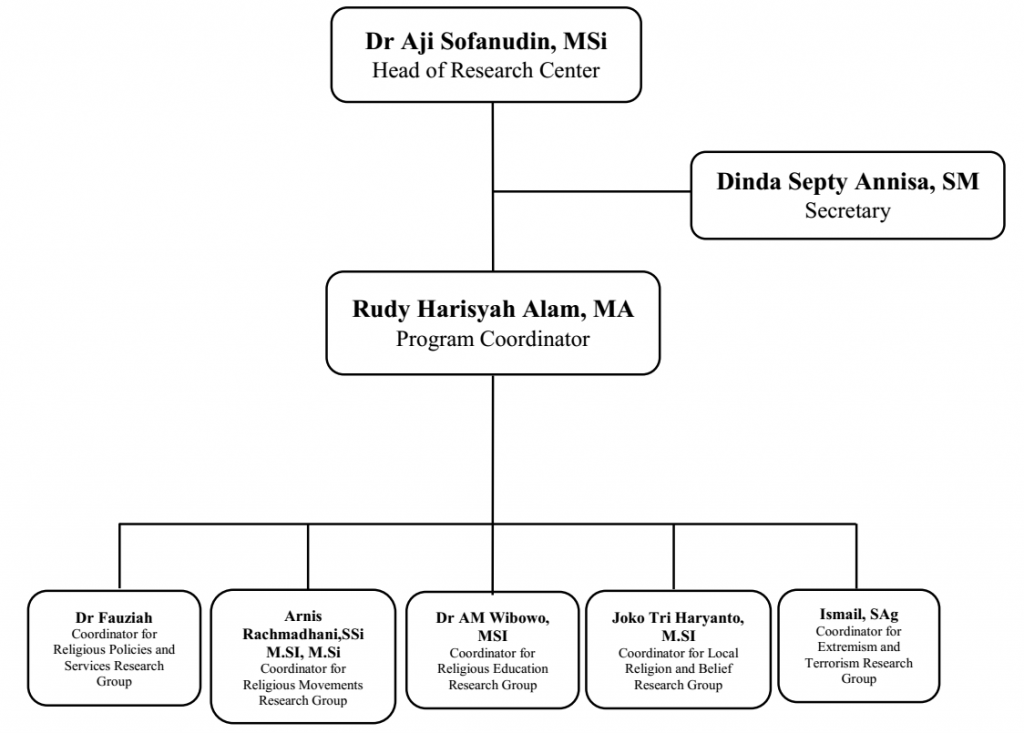Religion is extremely essential in the life of Indonesian society. This is reflected in the Indonesian people’s daily lives, which take the shape of diverse religious festivals and celebrations, houses of worship, religious buildings and sites, as well as various religious activities. Religion also inspires a variety of policy and regulatory documents that serve as the foundation for governing people’s lives. Religious life is dynamic in response to societal growth and human achievement in various fields. Religion not only impacts, but is also influenced by, changes in various facets of society’s social, economic, political, and cultural life.
Research Center for Religion and Belief was established on April 6, 2022, as a research center within the Institute of Social Sciences and Humanities (ISSH) of the Indonesian National Research and Innovation Agency (BRIN). The BRIN was established on 28 April 2021 in accordance with Presidential Regulation of the Republic of Indonesia Number 33 of 2021 on the National Agency for Research and Innovation. Later, this regulation was revised with Presidential Regulation of the Republic of Indonesia Number 78 of 2021 on the National Agency for Research and Innovation.
According to BRIN Regulation number 11 of 2022 concerning the Duties, Functions and Organizational Structure of the Institute of Social Sciences and Humanities, the Research Center for Religion and Belief has the task of carrying out tasks of research, development, study, and application as well as invention and innovation in the field of religion and belief.
In carrying out these tasks, Research Center for Religion and Belief performs the following functions:
- Execution of technical tasks in the fields of religion and belief, including research, development, study, and application, as well as invention and innovation;
- Preparation of scientific recommendation and responses;
- Technical advice and supervision;
- Implementation of cooperation; and
- Monitoring, evaluating, and reporting.
The Research Center for Religion and Belief has the following organizational structure:

Research Center for Religion and Belief is intended to function as an institution for the development of studies and research on religions and beliefs in Indonesia, as well as to contribute to the advancement of religious studies and research at the global level.
The Center’s research activities are carried out through research groups. In 2023 there are five research groups, namely: (1) Religious Policy and Services, (2) Religious Movements, (3) Religious Education, (4) Local Religions and Beliefs, and (5) Extremism and Terrorism.
The research group on religious policy and services conducts research on Hajj, Umrah, zakah, waqf, marriage registration, religious guidance, halal products, religion and national development (health, ecology, family, and economic empowerment), child protection, religious institutions, sharia economy, houses of worship, and other religious services.
The research group on religious movement focuses on religious organizations, religious sects, spiritual and mystical movements, digital religion, gender equality, and other contemporary issues. The research group on religious education studies pesantren, pabbajja, pasraman, dhammasekha, Sunday school, kuttab, madrasah, Quranic education for kindergarten, house of tahfidh, and the like. The research group on Indonesian religion and belief investigates the various beliefs that emerge and exist in the country. Finally, the research group on extremism and terrorism looks into religious extremism, radicalism, and terrorism.
A number of research projects conducted in 2022 includes:
- Strengthening the Capacity of Islamic Religious Counselors in Preventing Radicalism
- Religious Philantrophy in Indonesia: Mapping, Potential, and Problems of Waqf for Productive Economic Activities
- Resilience and Regeneration of Penghayat Kepercayaan kepada Tuhan yang Mahaesa in State Life in Central Java and D.I Yogyakarta
- Youth and the Spread of Extremist Narratives on Social Media
- Moderation and Recognition of Religious Groups in East Java: Capital for Creating a Culture of Peace in Interreligious Life
- Local Wisdom: Capital to Build a Culture of Peace in Interfaith Life
- Qanun on Education Implementation and Ideological Network of Islamic Boarding School in Aceh
- Construction of Culture and Values of Religious Moderation with Civil Society Content in Muslim, Christian, Hindu, Buddhist, and Konghuchu Communities
- Determinants of Digital Zakat, Sadaqah and Waqf Behavior: (Analysis of Good Corporate Governance and Sociospiritual on Urban Millennial Muslim Generation)
- Local Wisdom Approach in Religious Conflict Resolution Ahead of Pilkada and Election in Aceh Singkil District and Subulussalam City, Aceh Province
- Social Innovation of the Religious Affairs Office in Supporting Village Regulations on Child Marriage Prevention
- Religious Philanthropy and Terrorism Funding: Case Studies in the Provinces of DKI Jakarta, West Java and DI Yogyakarta
- Strengthening Education Services for Kepercayaan terhadap Tuhan YME in Central Java, East Java and D.I. Yogyakarta
- Underage Marriage and Family Resilience in Island Communities
Some of the international publications at the Research Center for Religion and Belief in 2022 include the following:
- Ecotourism of Cireundeu and Basic Sundanese’ Way of Life,
https://journal.ipb.ac.id/index.php/jmht/upcoming/view/37252
2. Evaluating Mandatory Tahfȋẓ Quran Program Implementation at Madrasa
https://journal.uinsgd.ac.id/index.php/jpi/article/view/20330
